



As you probably know by now, I collect books the way a magnet collects iron filings. Whatever you want to do with your writing life—or with your life in general—there’s a book for that! And probably a class as well. Do an online search for writing classes in your area and see what comes up! Some have a modest fee—or an immodest one! Check local libraries and retirement communities, which in the Richmond area often offer such instruction free.
Just now, writing memoir is popular, especially among older people. One of the points stressed in the recent James River Writers Conference panel on Compelling Characters was that even villains are heroes in their own stories. People want their hero stories known. So there are lots of classes on memoir writing, and books as well. These include Natalie Goldberg’s Old Friend from Far Away; Sue William Silverman’s Fearless Confessions; Lisa Dale Norton’s Shimmering Images; Frank P. Thomas’s How to Write the Story of Your Life; and Judith Barrington’s Writing the Memoir.
Every writer’s heard the advice, “Write what you know.” And what do you know better than your own life, right? But memoir is supposed to be as thorough, true, and factual as the writer can make it. So memoir isn’t for everyone. And so far at least, it’s not for me. Of the dozens of short stories I’ve had published, none is memoir.
On the other hand, most of them are memoir-based fiction. Such fiction still tells a true story, but is based only partly on “what really happened.” There are fewer helpful books in this area—on my shelves, at least—but two recent favorites are by Meg Files and Robin Hemley.
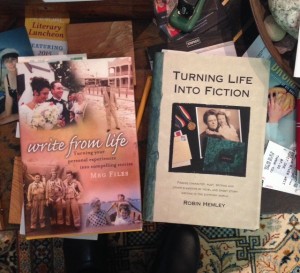
I’m working on a collection now titled Almost Family. As you might gather from that title, I include other people’s lives in my writing, too. One of my earliest publications was “The Pig Sticker.” The factual part of that story is my father and uncle butchering hogs. The true but fictional parts are everything else. In actuality, I was the toddler throwing my rag doll into the horse watering trough. In story as written, I was older, helping my mother and aunt with butchering-day chores and overhearing conversation that never happened. You can read that story here on my website. In Different Drummer, several of the stories are memoir-based, including “After The Fair,” which draws on three different women’s lives for the factual parts.
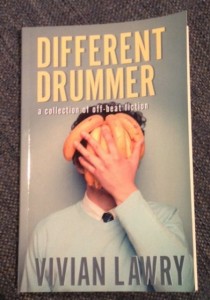
It’s perfectly legitimate to use bits of your real life or the lives of those you know in your writing. This is true whether you are writing memoir, essay, fiction, or poetry. As Susann Cokal told the audience at a past JRWC, “People will always look for you in your writing. If you write a mad, passionate sex scene that takes place on top of a desk, people visiting your office or study will look askance at your desk—and may even ask whether that’s the one.” To spare me—and my family—I like being able to say, “But it’s fiction!”
Saturday and Sunday were two great, packed, informative days! By the end of the Library of Virginia’s Annual Literary Luncheon, I was too caught up in events to write much, but that dam is about to break.
I’ve attended JRW Conferences since the earliest days, back when they were held at the Library of Virginia. I really liked that venue, the ambience, the close, personal feel of it. But the annual meeting outgrew the Library’s space. This year we met at the Greater Richmond Convention Center. It feels much more sterile, but there is plenty of room for meetings, plenary sessions, book signings and sales, plus convenient parking. Plenty of room for growth!
Let me say up front that the absolutely worst thing about JRWC is that I couldn’t attend every session. For example, on Saturday the concurrent sessions offered from 3:30-4:30 were How to Locate, Lure, and Land the Right Agent; To MFA or Not to MFA (virtues and vices of the academic route); Writing Diversity into Your Fiction (representing the larger world in your fiction, how and why); and 50 Shades of Red (on various aspects of writing erotica). What writer wouldn’t want to know all of that? (Well, maybe the kids/YA writers could skip the erotica.)
On the other hand, last week I mentioned that JRW classifies sessions by track. This year’s tracks were Diversity in Writing, Writing for Kids/YA, Poetry, The Pillars of Story, and Writing as Career 2.0. I tended toward The Pillars of Story, but not exclusively. Freedom to jump the tracks is one of the delights of the conference.
Hoping to find an agent for Nettie’s Books soon, I attended the session on getting the right agent (David Henry Sterry, Arielle Eckstut, Heather Flaherty, and Helen Heller, Bill Blume moderating). Although there was a lot of diversity on many things, (e.g., appropriate level of formality/informality) two areas of unanimity stand out: (1) research agents you intend to query; and (2) follow their online submission guidelines to the letter! The diversity of personalities on the panel was evidence that you (the writer) really should try to get a handle on your prospective agent as a person. Places to look are Facebook, blogs, Twitter, and any books the agent might have written. It also helps to hear them speak at a conference such as JRW, or meet them in a one-on-one session.
I’m currently working on a new novel, and the first 30 pages or so are pretty ho-hum. The presentation on conflict and tension was excellent (Raising the Stakes with Leah Ferguson, Valley Haggard, and Amy Sue Nathan, moderated by Jon Sealy). They reminded me of multiple aspects of tension and conflict: stakes can be personal or universal; conflict can be internal or external; a blocked goal = conflict; focus on physical or emotional danger; in every case, imagine the worst possible thing that could realistically happen in this situation and write it—you can always dial it back later for nuance. One thing I found especially helpful was Valley Haggard’s comment that readers connect with shame, pain, vulnerability, failure, and flaws. I wish I had a picture!
A Fine Romance (Leah Ferguson, Mary Chris Escobar, Amy Sue Nathan, moderated by M.M.Finck) brought genre into focus—women’s fiction vs. romance, into particular—and endings (happily ever after, happily for now, together but bittersweet because one or both had to sacrifice for it). Beyond that, what struck me is that their advice for writing a good romance or book of women’s fiction sounded just like the advice for good writing in general! Which reminds me: at the Festival of the Written Word, I’m on a panel with a title something like When Romance Meets Mystery. We shall see. Again, I wish I had a photo, but I was too far back in the hall.
But I did get a picture of the panel for Writing Memorable Characters: Stacy Hawkins Adams, Bruce Holsinger, Amy Sue Nathan, Kristina Wright, moderated by Josh Cane.
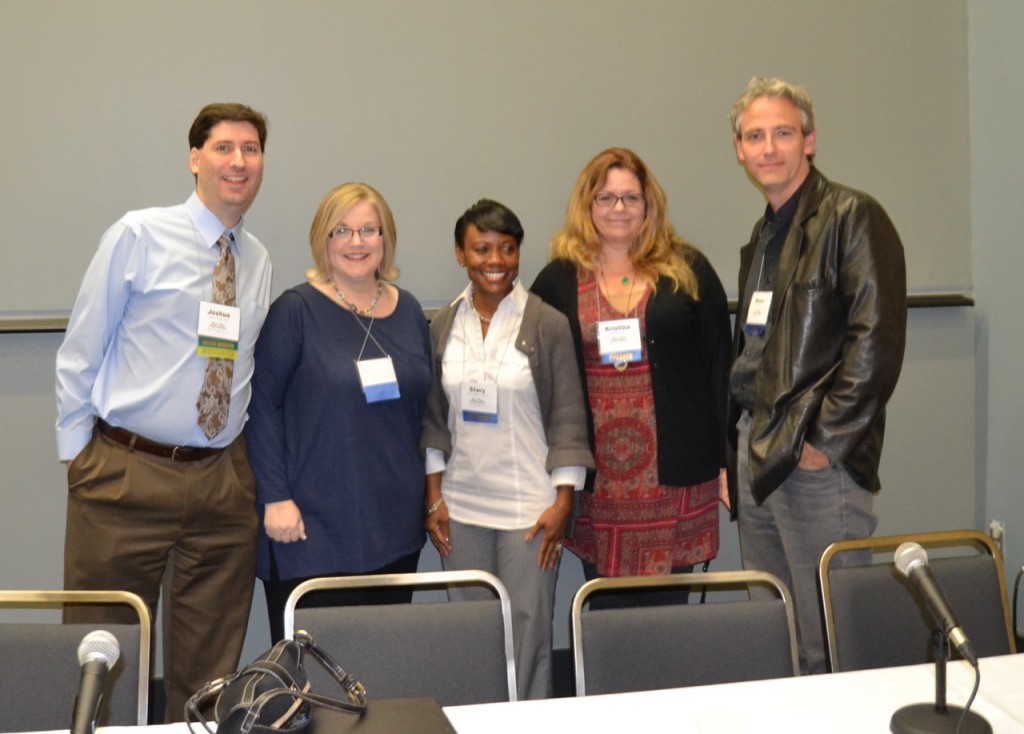
The variety of writing represented—inspirational women’s fiction and non-fiction, historical fiction, women’s fiction and romance, erotica—underscored the over-all rule that every type of writing (including memoir) needs memorable characters, and characters the reader cares about. The heroes and heroines need flaws. The bad characters need a good side. And one effective way of establishing both is to give readers the backstory.
The last plenary session was the Pitchapalooza (David Henry Sterry, Arielle Eckstut, and Rebecca Podos) during which the names of volunteers were drawn from a plastic pumpkin and each had 1 minute—precisely one minute!—to pitch his/her book. Great fun, and very informative as the panel commented on the stronger and weaker aspects of each pitch.
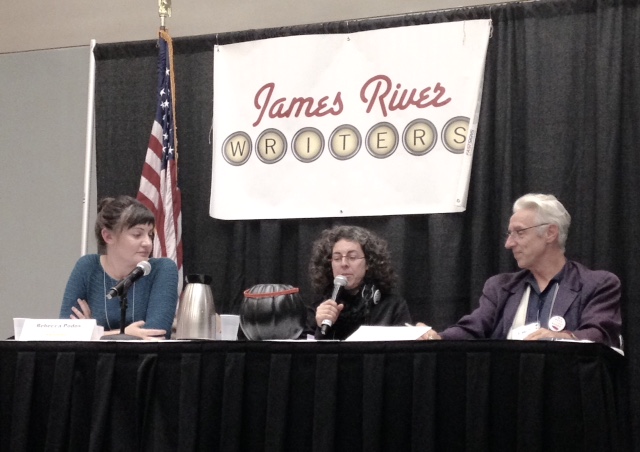
The closing was brief, but celebrated the winners of the Best Unpublished Novel Contest, the Emyl Jenkins Award, and Pitchapalooza. Although not a winner, I was recognized as a finalist in the Best Unpublished Novel Contest. Very gratifying. But egocentric being that I am, I wish the awards (except Pitchapalooza, of course) had been announced a the beginning of the conference. Maybe people I didn’t know before would have congratulated me!
Alas, the conference wasn’t all about me. It was mostly about the books—and there were many to be had, and signed. Fountain Bookstore sold the books of all the presenters.
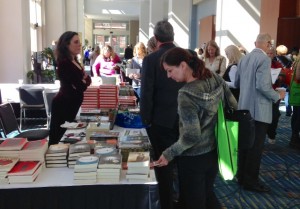
I usually come away from the JRWC feeling that I got more than I paid for. Unfortunately, this year, that included a raging cold, including coughing and congestion, that laid me low as of Monday morning. I assume it was all the back-slapping, handshaking, and hugging.
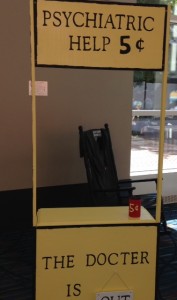
On the other hand, a nasty cold was a great reason to put my feet up, review my notes, and enjoy the contents of my conference bag. I checked the writing classes offered by VMFA Studio School and the Visual Arts Center; considered invitations to submit to the next Poetry Virginia Annual contest and join the Virginia Writers Club; and I could browse the free issues of Richmond Magazine and Broad Street. Already looking forward to next year! Though I did suggest to Katharine Herndon (JRW Executive Director) that next year they try to get a bright colored conference bag!
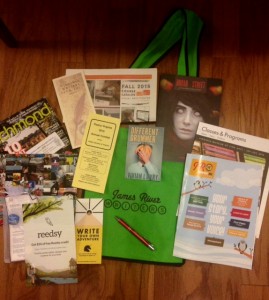
Janet Burroway once said, “In literature, only trouble is interesting.” Trouble is the source of tension, conflict, struggle, etc. And what better source of trouble than characters caught in toxic relationships.
 The Psychology Today website published a blog by Peg Streep titled, “8 Types of Toxic Patterns in Mother-Daughter Relationships.” (Yes, I know that scholars consider Psych Today to be pretty light-weight. I’m a card-carrying psychologist myself. But I like Psych Today. It isn’t intended to be a scholarly journal. It is a magazine for the public, and often prints what’s trending. And if a writer creates great fiction on a faulty premise, who cares?) But back to the main point. Streep labeled eight types of unattuned and unloving mothers:
The Psychology Today website published a blog by Peg Streep titled, “8 Types of Toxic Patterns in Mother-Daughter Relationships.” (Yes, I know that scholars consider Psych Today to be pretty light-weight. I’m a card-carrying psychologist myself. But I like Psych Today. It isn’t intended to be a scholarly journal. It is a magazine for the public, and often prints what’s trending. And if a writer creates great fiction on a faulty premise, who cares?) But back to the main point. Streep labeled eight types of unattuned and unloving mothers:
The labels are pretty indicative of the toxicity described. Read the actual blog. The good news for writers is that these toxic relationships needn’t be limited to toxic mothers and vulnerable daughters. (You may recognize here an echo of what I said about Deborah Tannen’s analysis of mother-daughter communication patterns: what one says isn’t necessarily what the other hears could apply to virtually any long-germ relationship.) In this instance, consider toxic relationships between husbands and wives. Consider boss and subordinate. Consider role reversal in that it’s the daughter who is toxic.
Three cheers for toxic (literary) relationships!
The Principle of Least Interest
Why Women Have Sex: Character Motivation Matters
Rational and Irrational Behavior in Your Characters: Guest Post on Thrill Writers
Books for Writers: Deborah Tannen
I’m currently at the James River Writers Conference. Here’s more about the conference.
Is This Writers Conference for Me?
The answer depends on what you are looking for, of course. In my experience, there are essentially two types of writers conferences: those that focus on fans and writers meeting-and-greeting, and those that focus on the craft of writing.
Virginia Festival of the Book is an annual conference for fans that lasts a week, cuts across genres, and most events are free! Bouchercon and Malice Domestic are two examples of fan conferences for mystery writers and fans. (Romance, fantasy, Sci-Fi, horror—all genre writers—have similarly dedicated conferences.) Bouchercon rotates worldwide (New Orleans in 2016), but Malice Domestic is always in the greater DC area. They spotlight big-name writers who address plenary sessions, receive honors, are interviewed, and sign books. Selfie opportunities vary. Lesser-known writers present panels and sign books. Everyone on the program has a book-signing slot. Lots of books get signed. There’s an area for exhibitors, everything from Sherlock Holmes deer-stalker hats to clothes and jewelry. At a conference such as this, I rode in the elevator with Sue Grafton, met Nevada Barr, and honored Dick Francis. They can be quite fun.
The annual James River Writers Conference (always in Richmond, Virginia) is of the improve-your-craft sort. Although awards are given and books are signed, the focus is on helping and supporting writers at all levels. All genres are welcome. JRW develops tracks so that attendees can easily identify related presentations over the two-day conference (e.g., Diversity in Writing, Poetry, Writing as a Career). Presentations are informative. Besides connecting with (relatively) local writers, there are options for meeting with agents, and learning to make more powerful first impressions.
Whether you are a writer, a reader, or both, there’s a conference out there for you!
Updated October 20, 2015.